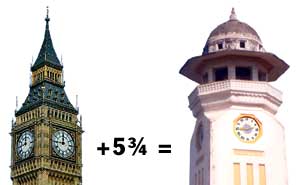 Never mind Mt Everest and our double triangle flag. There is another thing that distinguishes us among the community of nations: Nepal Standard Time, which is 5 hours and 45 minutes ahead of GMT.
Never mind Mt Everest and our double triangle flag. There is another thing that distinguishes us among the community of nations: Nepal Standard Time, which is 5 hours and 45 minutes ahead of GMT. More significantly, it is 15 minutes ahead of Indian Standard Time. And that sets us apart, because it is the only time zone in the world that is only 15 minutes different than that of an adjacent country.
The sun rises in Dhangadi 32 minutes after it dawns in Bhadrapur, not really an oddity since the whole of China is one unwieldy time zone. When it is six in the evening at the Friendship Bridge at Kodari, it is already nine at night across the Bhote Kosi on the Chinese side.
In the Malla period, Kathmandu residents had their own traditional way for telling time. If you wanted to know the exact time, you went to a pond near Hanuman Dhoka where an official would tell you how many pala had submerged since dawn. Each pala had a tiny hole and would fill up in exactly 24 minutes. "This method was OK for us until the Westerners arrived," explains Sambaraj Acharya, professor at Balmiki Campus.
And with them came global time zones. Set in 1884, it agreed to use the Greenwich meridian as zero and measure 24 standard meridians on longitudes 15 degrees apart. But it was not till 1956 that we set our watches for the first time to Nepal Standard Time, with the meridian at Mt Gauri Shankar, 100km east of Kathmandu. It
wasn't Mt Everest because Gauri Shankar was closer to Nepal's centre of gravity, as it were.
It was a choice that set our clocks 10 minutes ahead of India, which at the time used the longitude that passed through Calcutta. When our neighbours switched their meridian to Hyderabad in 1971, we officially had four degrees of separation, and presto, found ourselves a further five minutes ahead of the Indians.
With the information age, there is now some grumbling that we should set ourselves to Indian time. Acharya is
unimpressed. He told us: "Why should we change something that is well established, scientific and accepted?" Apparently it's not as simple as rounding off to the nearest zero. More nationalistic naysayers will probably dismiss the idea simply on the grounds that our perceived lead over India will narrow.
How much are those 15 minutes worth? For most Nepalis it is part of an inbuilt elasticity when it comes to punctuality-the foundation of the old 'Nepali Stretched Time' joke. It is our grace period, a quarter of an hour that we tack onto to every appointment and still consider ourselves to be "on time". Even if we are, technically, 15 minutes late.


